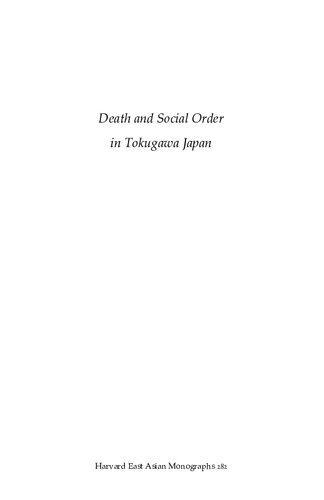

Most ebook files are in PDF format, so you can easily read them using various software such as Foxit Reader or directly on the Google Chrome browser.
Some ebook files are released by publishers in other formats such as .awz, .mobi, .epub, .fb2, etc. You may need to install specific software to read these formats on mobile/PC, such as Calibre.
Please read the tutorial at this link: https://ebookbell.com/faq
We offer FREE conversion to the popular formats you request; however, this may take some time. Therefore, right after payment, please email us, and we will try to provide the service as quickly as possible.
For some exceptional file formats or broken links (if any), please refrain from opening any disputes. Instead, email us first, and we will try to assist within a maximum of 6 hours.
EbookBell Team

4.0
56 reviewsBuddhism was a fact of life and death during the Tokugawa period (1600-1868): every household was expected to be affiliated with a Buddhist temple, and every citizen had to be given a Buddhist funeral. The enduring relationship between temples and their affiliated households gave rise to the danka system of funerary patronage.
This private custom became a public institution when the Tokugawa shogunate discovered an effective means by which to control the populace and prevent the spread of ideologies potentially dangerous to its power--especially Christianity. Despite its lack of legal status, the danka system was applied to the entire population without exception; it became for the government a potent tool of social order and for the Buddhist establishment a practical way to ensure its survival within the socioeconomic context of early modern Japan.
In this study, Nam-lin Hur follows the historical development of the danka system and details the intricate interplay of social forces, political concerns, and religious beliefs that drove this "economy of death" and buttressed the Tokugawa governing system. With meticulous research and careful analysis, Hur demonstrates how Buddhist death left its mark firmly upon the world of the Tokugawa Japanese.